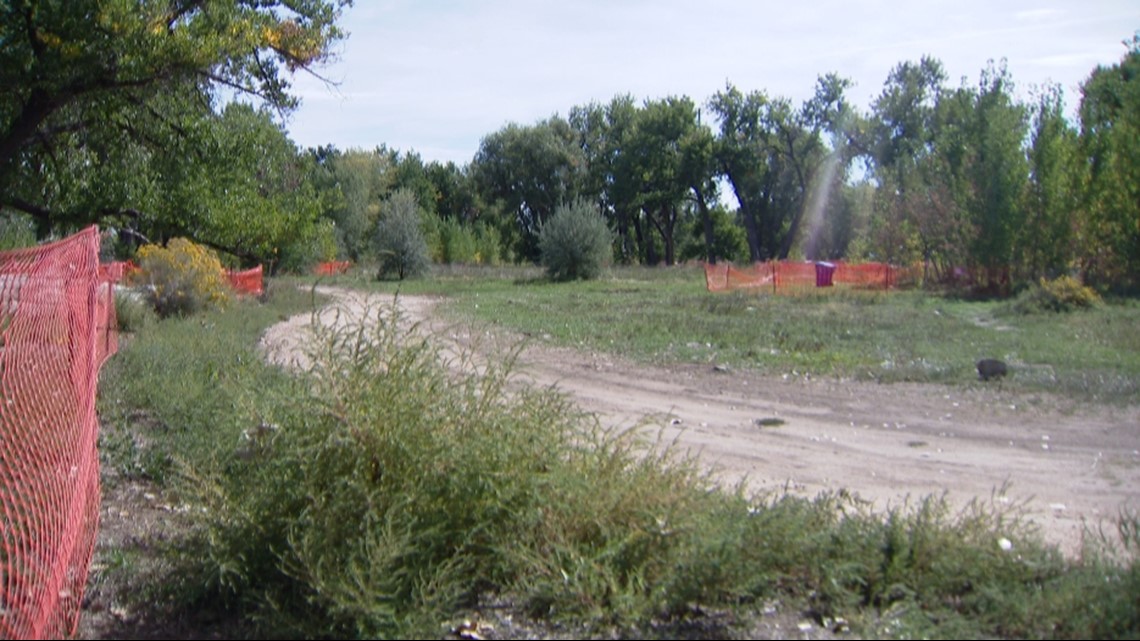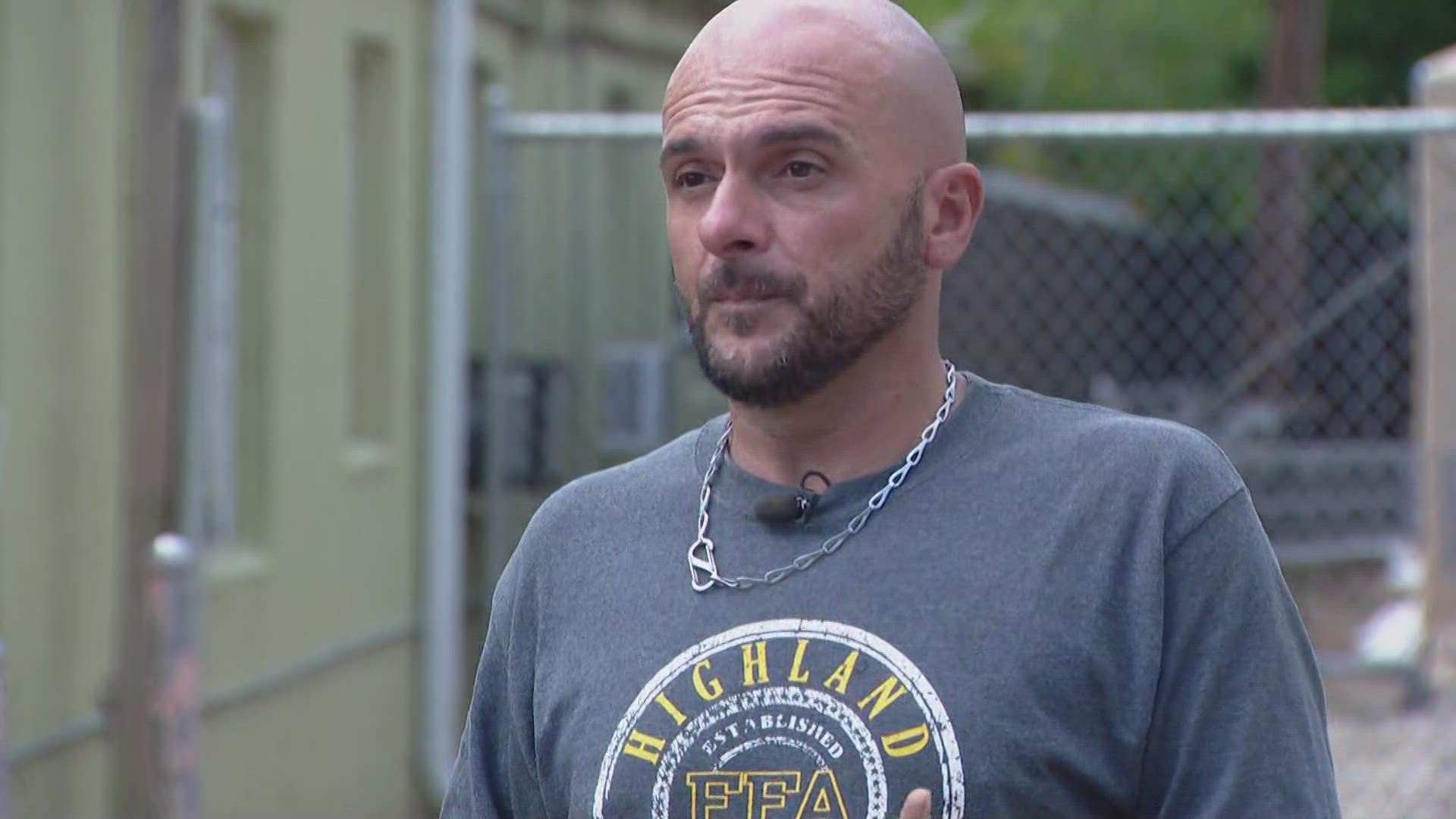LOVELAND, Colo. — The City of Loveland closed King's Crossing Natural Area after the removal of 55-58 encampment sites where people experiencing homelessness were not authorized to live.
The closure happens on Friday and will be indefinite as crews work to restore the area, according to the city's parks and recreation director, Elizabeth Kayl.
She said the city has offered temporary housing, storage for valuables and other services to those who were relocated.
"Some of their 'spots,' as they say, were their homes and those people were there for years," said Michael Hefner.
Hefner has been unhoused since August of last year. In February, the shelter he was staying at closed down after winter ended, leaving him with no place to stay.
"Where do you go? I didn't have everything prepared, I didn't know exactly what to do," said Hefner. "So I followed suit with some of the folks around here and took camp down there at King’s Crossing.”
Loveland's City Council passed an emergency camping ban in May. The city has been slowly pushing people out of King's Crossing since June forcing Michael and dozens of other people to leave without the opportunity to return.
"The City of Loveland is really embarking on a new program that assists these individuals not only in getting relocated to areas that are appropriate for their shelter, but also for the services so desperately needed for these individuals," said Kayl.
She said King's Crossing is a 13-acre natural area and has been the "epicenter" of homeless encampments in Loveland.


"By having encampments here that causes pause to individuals to in terms of safety, in terms of access, in terms of just seeing the site in disarray," said Kayl. "Additionally, businesses within this area have experienced some negative impact from some of the encampments that we’ve seen here at King’s Crossing.”
During the closure, she said crews will work to restore the area. Kayl provided a list of damages, including:
- Damage to native grasses and plants.
- Promoted untreated weeds and invasive species as a result of not being able to treat noxious species with active camps in these areas.
- Human waste and trash have impacted the water quality of the Big Thompson River.
- Human waste, food waste and trash have attracted unwanted rodents and insects.
- Fencing, gates, signage, trash cans, etc… have been removed, damaged or destroyed.
- Hazardous waste, small trash, cans, straws, etc…scattered throughout the site.
- Burnt, broken and cut trees and limbs.
- Soil damage.
- Made-made holes, bunkers and fire pits.
- Wildlife habitat has been destroyed, moved and impacted.
- Evidence of fires throughout the site, including burnt benches, fencing and materials.
- The soft-surface trail has been widened and rutted into a wider corridor. There are dozens of new social trails throughout the vegetation.
- Damage to the river banks and eroded areas.
“This will include such things as our Loveland Fire and Rescue Authority to come in and do fire assessment and mitigation techniques," she said. "It will allow me to bring in my specialists in open lands and trails to assess the area for any type of re-seeding that needs to be done, any wildlife corridor mitigation, any types of issues that will prohibit us from having the natural area at its natural state.”
Hefner said the city offered him temporary shelter at a hotel with a kitchenette.
"I thought it was a wonderful thing, but at the end of 30 days I found myself reeling to figure out what I was going to do," he said.
Now he's back at the shelter he started at.
"Could be a lot worse, could be a lot better," said Hefner.
That shelter is now the Loveland Resource Center which is run by the city, offering day-time services and beds for more than 20 people. It's located at 137 S. Lincoln Ave.
"Loveland has the equipment, the care and the wherewithal to put it together... when it comes to let's eliminate homelessness or let's at least offer a solution," said Hefner.
The House of Neighborly Service is a local resource center, that assists people at-risk of becoming unhoused or those currently experiencing homelessness. Assistant director Cheryl Wong said they've seen a 100% increase in the need for their services, compared to last year. That includes things like food, clothing, utility assistance, prescription assistance and transportation.
“It’s heartbreaking," said Wong. "For many people, they’re having to decide, 'Do I buy food?' 'Do I pay my utilities or do I pay my rent?'"
She said the rising cost of rent and groceries, as well as people losing good-paying jobs or hours, is largely contributing to the need for services.
“This is hard. It’s not easy for anybody," said Wong. “It takes all of us having a conversation together saying this is what I can do or this is what we can do.”
To support people experiencing homelessness in Loveland, you can donate time, money or items to House of Neighborly Service.
SUGGESTED VIDEOS: Latest from 9NEWS

